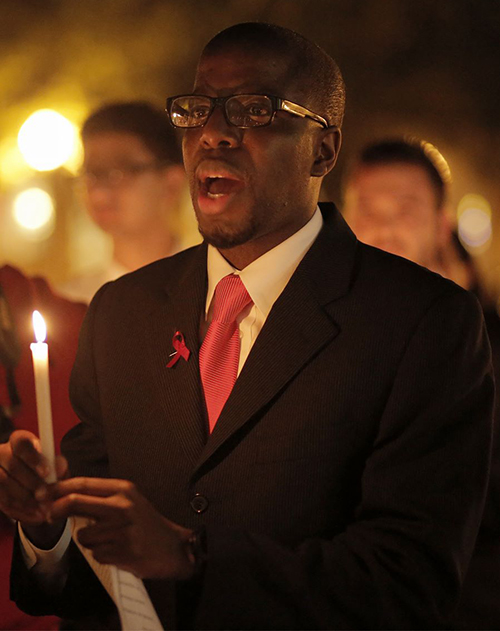Students to shine light on HIV/AIDS at Friday's vigil


In observance of World AIDS Day, College of Medicine students Friday will host the Second Annual HIV and AIDS Awareness Candlelight Vigil. The event, scheduled for 6 p.m. in the college’s atrium, will include HIV testing, educational booths, student performances and remarks from Ajegbu Okeke, Pharm.D., Bond Community Health Center’s pharmacist.
“This disease has no race, no sexual orientation and no gender,” said Class of 2019 Vice President Eric Walker (pictured right), who’s leading the vigil. “We have to break down stereotypes. If we don’t, people begin to think HIV and AIDS will never affect them. That’s part of the reason we haven’t eradicated it.”
The human immunodeficiency virus causes acquired immune deficiency syndrome and interferes with the body’s ability to fight infections. More than 1.2 million people in the U.S. are living with HIV, although about 12 percent of them don’t know it.
“The populations most at risk in Florida are men who have sex with men, injection drug users and women who are African-American or Hispanic,” said the college’s HIV/AIDS expert, Jonathan Appelbaum, M.D.
World AIDS Day is observed globally on the first day of December each year. The medical students scheduled their event one day later so it wouldn’t conflict with Florida A&M University’s Thursday vigil.
“I have my master’s in public health from FAMU,” said Walker, community service chair for FSU’s Student National Medical Association chapter. “I wanted to bring this event over to Florida State, because I wanted to bring awareness to another segment of the population in Tallahassee.”
The first case of HIV was discovered in 1981. Currently, the best vaccine is 35 percent effective; it must reach 90 percent before it can be used. Although there is no cure, the virus can be managed with a cocktail of medications taken daily.
“The first single-tablet regimen where three different medications were combined into one was developed in the early 2000s,” said Appelbaum. “When the first cocktails came out, they were basically a handful of pills that you had to take three times a day. The drugs now are easier to take, have fewer side effects and fewer interactions with other medications.”
Despite these advances, Appelbaum says much work remains.
In addition to the traditional behavioral methods of prevention, like using a condom, there is also medication available for those at high risk but not yet infected.
“PrEP (Pre-Exposure Prophylaxis) uses a combination of two medications taken daily for someone who is not infected with HIV to decrease the risk of transmission of HIV from someone who is infected,” said Appelbaum.
PrEP is FDA-approved, and many studies have shown it to be effective. It’s prescribed locally, but Appelbaum points to barriers.
“The big concern is for people who don’t have insurance,” he said. “And there are a lot of people who don’t even know PrEP is available.” (Read about student Tim Walsh’s AMA award-winning research on PrEP.)
The college hosted its first vigil to raise HIV/AIDS awareness last year. Walker led that one as well, adapting what he learned from FAMU’s vigils. He’s laying the groundwork for future students to continue the event.
“I want the vigil to represent solidarity,” he said. “It will be people from all walks of life coming together and bringing awareness of HIV and AIDS.”
Get all the facts on HIV/AIDS at www.aids.gov.
The following student and community organizations are involved:
• Alpha Kappa Alpha Sorority.
• Bond Community Health Center.
• Christian Medical Association (CMA).
• FAMU Future Public Health Professionals.
• FSUCares.
• Gays, Lesbians and Allies Advancing Medicine (GLAAM).
• Latino Medical Student Association (LMSA).
• Minority Alliance Advocating Community Awareness and Action (MAACA).
• Multicultural Association of Pre-Med Students (MAPS).
• Student National Medical Association (SNMA).

